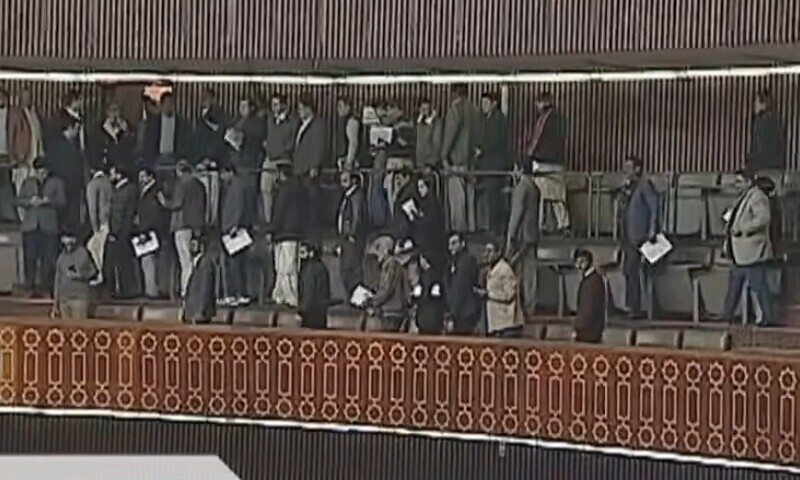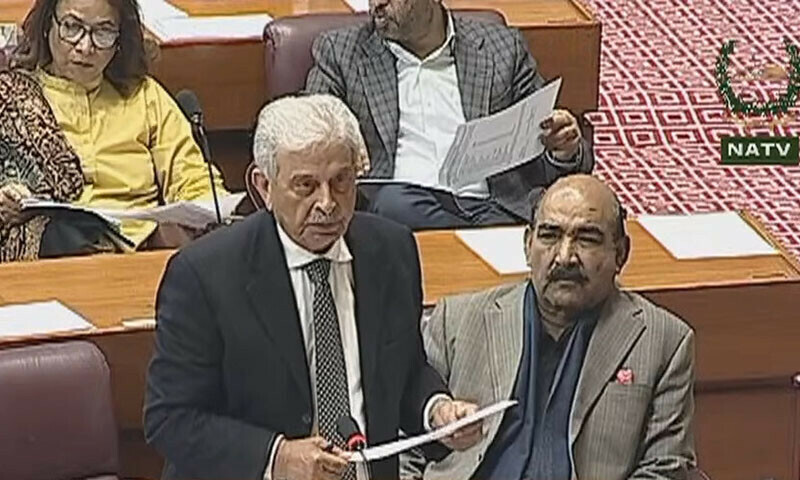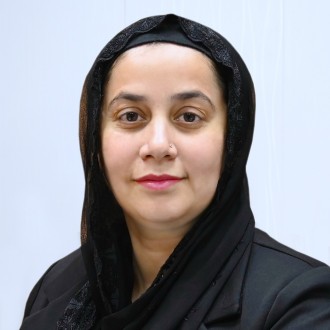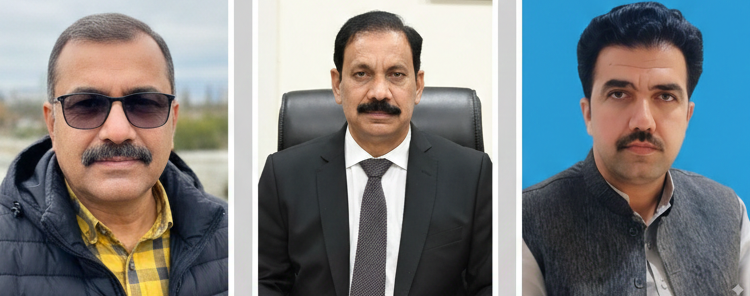The National Assembly Thursday passed a controversial amendment bill to the country’s cybercrime laws amid a walkout by PTI lawmakers and journalists from the proceedings.
The bill which was introduced in the House on Wednesday, was taken up for consideration as a supplementary agenda on Thursday. The National Assembly Standing Committee on Interior also approved the bill aimed at controlling the Freedom of Expression on the same day which later was moved for passage in the House.
English Daily News reported that none of the coalition parties of the government opposed the PECA Act Amendment Bill 2025, while the opposition walked out before the bill was introduced by federal Minister Rana Tanveer. Jamiat Ulema-e-Islam Fazl (JUIF) members opposed the bill. JUIF female MNA Aliya Kamran did not support both the bills [ also the Digital Nation Pakistan Bill 2025] and said ‘no’ to the proposed legislations when presented for approval of the House.
The federal cabinet at its meeting on Tuesday last had allowed changes in Government’s Rules of Business 1973 to shift responsibility of the Prevention of Electronic Crime Act (PECA) from the Ministry of Information and Broadcasting to the Ministry of Interior. So the Standing Committee of Interior okayed the bill instead of the Ministry of Information and Broadcasting before it was passed by the National Assembly.
Addressing concerns of the journalists in press lobby, Federal Minister of Information and Broadcasting Attaullah Tarar said the Prevention of Electronic Crimes (Amendment) Bill 2025 was not a draconian law, and it was not aimed at targeting mediapersons belonging to electronic and print media, rather it would protect them.
He insisted that the legislation would not affect journalists working in electronic and print media and it was aimed at having checks and balances on social media so that individuals associated with online platforms are answerable to any authority to prevent cybercrimes.
The proposed legislation said: “Whoever intentionally disseminates, publicly exhibits, or transmits any information through any information system, that he knows or has reason to believe to be false or fake and likely to cause or create a sense of fear, panic or disorder or unrest in general public or society shall be punished with imprisonment which may extend upto three years or with fine which may extend to Rs2 million or with both.”
The statement of objects and reasons of the Prevention of Electronic Crimes (Amendment) Bill 2025 said that the proposed law aims to modernise and enhance the legislative framework for combating cybercrime in Pakistan, ensuring alignment with present-day requirements and addressing the growing complexities of cyber threats.
The Social Media Protection and Regulatory Authority (SMPRA) under the Prevention of Electronic Crimes (Amendment) Bill would ensure online safety and rights of persons on social media platforms from any kind of harms, regulate the unlawful offensive content on social media platforms available in Pakistan, regulate enlistment of social media platforms, and grant, renew, refuse, suspend and enlist social media platforms.
The authority would also be empowered to partially or fully block a social media platform if it fails to comply with guidelines as given under the legislation. The SMPRA would also issue directions to the relevant authorities to block or remove the unlawful or offensive content for the reasons to be recorded in writing for a period of 30 days subject to grant of another extension if any for maximum period of 30 days by majority of all the members of the authority.
The authority would consist of a chairperson and eight members of which the interior secretary, Pemra chairman, PTA chairman or any other member would be ex officio members. The National Assembly also passed Digital Nation Pakistan Bill 2025. According to the statement and objects of the bill it is aimed to transform Pakistan into a digitally empowered nation by fostering a dynamic digital society, a robust digital economy, and efficient digital governance.
Recognising the potential of digital technologies to drive innovation, economic growth, and societal well-being, the proposed legislation seeks to accelerate sustainable development, enhance public service delivery, and modernise governance for improved transparency and effectiveness.
The bill envisages establishment of key governance bodies: the National Digital Commission (NDC), Strategic Oversight Committee (SOC), and the Pakistan Digital Authority (PDA). The NDC, to be chaired by the prime minister and comprising federal and provincial leadership, would set the strategic vision and policy framework for the country’s digital transformation.

The PDA would implement these policies by coordinating and harmonising digital initiatives across all levels of government, while the SOC would monitor the PDA’s performance and provide an independent review to the NDC ensuring alignment with the master plan. The National Digital Masterplan would provide a comprehensive strategy for aligning and optimising digital initiatives, eliminating redundancies across federal, provincial and local levels, and driving economic growth through enhanced public service delivery.
The implementation plan would detail specific projects, required resources, timelines and risk management strategies to ensure its effective execution. The bill further emphasises effective data governance to ensure secure and responsible data management and prioritises the development of digital public infrastructure and data exchange layer to foster innovation, enhance public services, and safeguard citizen privacy.
The enactment of this legislation reflects Pakistan’s commitment to responsibly leveraging digital technologies for economic growth, modem governance, and digital inclusion, aligning the nation with global best practices in the digital age.
Meanwhile, the PTI parliamentarians of Pakistan Tehreek-e-Insaf (PTI) continued their protest in the House raising slogans and carrying placards, demanding release of party’s founder chairman Imran Khan. They walked out from the House after the opposition leader Omar Ayub Khan was not given the floor to speak on a point of order.
Later, talking to the media outside the Parliament House, Leader of the Opposition in the National Assembly Omar Ayub Khan claimed that the Digital Nation Pakistan Bill and PECA Amendment Bill are designed to control the already under pressure media, the opposition, and subvert civil liberties.
Omar Ayub believed that basically they wanted all the digital network, including cell phones, Facebook, internet, whatever it is…all the data will come under one roof and a person will be appointed over the authority and he can be anyone, as already non-civilians are sitting in Nadra.
He continued that according to their set criterion, his qualification is only graduation, no need for masters and even PhD, and through him, the data of all members of free media — formal or informal — will come to him. “The fire will be at the media and the opposition. Side by side, they were in such a hurry that they did not wait for our dissenting vote,” he regretted.
Omar said they had informed the House standing committee concerned and its secretary that the dissenting note would be submitted. The opposition leader charged that through amendments to the PECA Act, the already ‘controlled’ media will face even more restrictions.
The Pakistan Peoples Party and Muttahida Qaumi Movement-Pakistan had previously opposed the bill but on Wednesday, perhaps there was a signal from somewhere or there was a use of stick or whatever, they gave their vote for the digital bill during the National Assembly Standing Committee on Information Technology meeting. “Our six members opposed it and voted against it and today [Thursday] we issued a dissenting note as well,” he said.
In his letter to the NA committee chairman and the dissenting note on behalf of the opposition, Omar Ayub expressed reservations on the Digital Nation Pakistan Bill and noted the bill is against the protection of the rights of Pakistanis.
He wondered how and who will cover the integrity of the data collected, insisting that data protection law is important, and that without the said law, this proposed legislation shouldn’t be passed. This proposed Digital Nation Pakistan Act 2024 and entities being created out of its passage (Pakistan Digital Commission and Pakistan Digital Authority), he contended, will ‘weaponise’ this legislation to act against innocent freedom loving citizens of Pakistan.
“This legislation is a ‘weevil worm’ and will eat into the fabric of Pakistan’s freedom (whatever little is left). Press freedom, civil liberties and all associated freedoms will be trampled under this ‘weaponised’ legislation because it will be used as a tool to ‘vacuum’ all data associated with an individual and the electronic ‘foot-print’ of individuals will be and can be used against them for building false criminal cases. There are numerous examples that can be quoted in which the existing legislation has been misused. This legislation will be a catalyst to subvert civil liberties,” read the dissenting note.
The leader of the opposition argued that centralised data will increase surveillance so there needs to be protection against surveillance of citizens with specific clauses in relation to protection against unlawful surveillance, including avenues of redressal.
In his note, Omar said that internet shutdowns, even on election day, will suspend digital ID also. This necessitates a guarantee that internet shutdowns won’t happen; Internet throttling through firewall will slowdown and destroy the DPI also. “Over 56 percent of Pakistanis are away from the internet or are not digitally literate. Digital Nation Act is a threat to the free citizens of Pakistan. This bill is a major restriction on Freedom of the Press and Civil Liberties. The rights of Pakistani citizens are not being protected in the country,” he said.
Internet shutdowns, he pointed out, have been occurring in Pakistan, which has harmed Pakistan. “Non-civilians have been recruited in most IT-related departments. Appointment of non-civilians to sensitive positions is a violation of privacy laws,” he charged.
He lamented that sharks only harm Pakistan’s internet network, accusing the government of destroying Pakistan. He regretted that the government is not talking to the opposition on the appointment of the chief election commissioner. Speaking on the occasion, PTI’s Zartaj Gul said they were told on Wednesday that there is a meeting of the IT Standing Committee, adding the meeting was called during the emergency and there was not even a copy of the agenda. She charged that those who claimed to be from the democratic party supported the government in the controversial bill.
“Our opinion was not heard in the standing committee. If the government does not like their deeds on social media, then they should fix their deeds. The Constitution is being violated,” she charged. “The world has moved towards globalisation, but here we are being taken to the Stone Age,” she said.
Meanwhile, the Joint Action Committee of journalist organisations has outrightly rejected the controversial amendment, announcing its decision to approach the court against the bill and launch a protest movement.
The committee consists of Pakistan Federal Union of Journalists (PFUJ), All Pakistan Newspapers Society (APNS), Council of Pakistan Newspaper Editors (CPNE), Association of Electronic Media Editors and News Directors (AEMEND) and Pakistan Broadcasters Association (PBA).
A special meeting of the JAC was held during which it was stated that the federal government has breached its promise by getting the controversial bill passed in the National Assembly without consultation. The focus of this bill is not just social media, but also electronic and print media’s digital platforms, with the aim of criminalising dissenting opinions. However, if the government still wishes to consult stakeholders, the approval of this controversial bill in the Senate should be postponed. Otherwise, the JAC will begin its protest plan, the meeting vowed, according to a joint statement of the media bodies.
The committee said that in case the bill is presented in the Senate, there will be protests not only during the session but also a nationwide call for demonstrations. A large protest rally will be held in Islamabad, in which all journalist organisations will participate. Lawyers, human rights organisations, civil society and political parties will also be invited to join the protests.
The JAC also decided to challenge the PECA Act amendment bill in court after its final approval, and consultations with lawyers have already begun. The joint forum of journalists reiterated that while the journalist organisations are not against any law, they cannot accept legislation made without consultation.
Digital Rights Foundation Executive Director Nighat Dad said the government is legitimising arbitrary decisions by agencies such as the FIA. The bill was passed without consultation. Digital rights advocacy organisation Bolo Director Osama Khilji said that the PECA ACT legalises many illegal methods to curb the Right to Freedom of Expression and Association, adding that with the passage of this amendment, there is a fear of further persecution of journalists and social media.
Meanwhile, the PFUJ vehemently and outrightly rejected the amendments to the Prevention of Electronic Crime Act 2016 (PECA), threatening nationwide protests until the amendments are withdrawn. PFUJ President Afzal Butt and Secretary General Arshad Ansari, in a statement, expressed their outrage over the passage of the amendment bill, which they claim was facilitated by the opposition’s staged walkout from the National Assembly.
The PFUJ leaders urged the government to immediately withdraw the amendments, calling them the “blackest law” of Pakistan’s history adopted by a democratically-elected government. They said that they were deeply disappointed by the government, led by those who had promised to consult them before passing the amendment bill. “Government kept the stakeholders in dark and passed the law in great haste,” they opined.
The PFUJ’s stance is supported by various media stakeholders, who have also condemned the amendments, citing concerns over Freedom of Speech, while the PFUJ has reaffirmed its commitment to protecting Press Freedom and Free Speech, stating that it will defend these fundamental rights “by all means”.
The PFUJ leaders issued a firm warning to the government, emphasising that Pakistan’s ranking on the Press Freedom and Free Speech index is already declining and that the newly adopted amendments will exacerbate this trend. They asserted that the amendments to the PECA will further embarrass the struggling media and rights activists, and therefore, they categorically reject these amendments.
They made it clear that the journalist fraternity will not accept this at any cost and that the PFUJ will consult all unions to launch a nationwide protest against the “black law,” which aims to intensify censorship and curb media and social media freedom besides stifling dissenting voices.
The PFUJ reiterated its belief in consultative and open debates for the legislative process, criticising the government for not consulting stakeholders while tabling or adopting the bill. This stance is consistent with the PFUJ’s history of advocating for press freedom and freedom of expression.
The joint action committee of the stakeholders will also be consulted and taken into confidence to launch a nationwide protest against (amendments to) the PECA. The Lahore Press Club governing body has also expressed concern over the passing of the PECA Amendment Bill and said that such tactics are a sign of the government’s senselessness.
President Arshad Ansari said that the government held a Zoom meeting with the parties for consultation on the PECA Act but no written draft was provided for the meeting. He said that under the guise of free speech, we are not in favour of any unbridled freedom, but will not accept a law imposed without consultation.
The Karachi Press Club (KPC) has also strongly condemned the amendments, deeming them a threat to Freedom of Expression. KPC President Fazil Jamili and Secretary Sohail Afzal Khan emphasised that Article 19 of Pakistan’s Constitution guarantees every citizen’s right to free expression. The press club denounced the suppression of voices, particularly in civilised societies, and urged the government to withdraw the “black law” immediately. Jamili suggested that instead of stifling free speech, the government should empower mainstream media to report accurate news in real-time, thereby countering fake news on social media. The KPC leaders advised the government to consult all stakeholders, including media bodies and civil society representatives, before introducing or implementing any laws.
Pakistan Peoples Party (PPP) Human Right Cell President Farhatullah Babar has termed the new cybercrime law ‘enlarging footprint of intelligence, and frightening’. “The proposed changes to cybercrime law aims to further stifle the Freedom of Expression through setting up of multiple authorities under executive control, enlarging foot print of unaccountable intelligence agencies and giving sweeping powers to the executive not only over the contents of the message but also the messengers, namely the social media platforms,” he said.
The PPP leader said that a highly disturbing aspect of the law is that the social media authority will form Joint Investigation Teams (JITs) with members drawn from unnamed intelligence agencies to investigate allegations against journalists, social media users and the general public.
He said this is a dangerous enlargement of the already large footprint of unaccountable state agencies in governance and deeply impacts all strata of society, not merely journalists and social media users. “What the JITs with dominance of intelligence agencies are known to have done in the past needs no elaboration,” he said.
Farhatullah said the law stipulates creation of a government-appointed tribunal to adjudicate appeals against arbitrary decisions of another executive-appointed body called SMPRA in the cases of Freedom of Expression. “As if appeal against an executive authority before another executive authority is not enough of a mockery, the law also restricts the tiers of judicial appeal to only one before the Supreme Court,” he said.
He said this limitation of judicial tiers amounts to extending the torture of aggrieved citizen for exposing corruption, malpractices and skeletons in the cupboards of high and mighty.
He said that so far, the arbitrary shut downs of social media platforms like ‘X’ were denied by the government. “Under the new law the Social Media Authority is empowered to close down any social media platform. Apart from powers to block the content it shall have the powers to block the carrier of the content,” he said.
He said the spectre of disappearing both the creator and carrier of the message without oversight and accountability on the basis of reports of unaccountable agencies is frightening. Farhatullah urged the members of Parliament to reject the proposed legislation, saying: “It will stand out as black line in the CVs of members voting it.”
He also reminded that when the Pakistan Tehreek-e-Insaf (PTI) government introduced similar curbs the opposition at the time stoutly resisted it. “Now in power they can go back on their earlier stance only at the peril of their credibility and public standing. There is enough baggage that the Parliament carries and it is best to not add to it,” he said.





